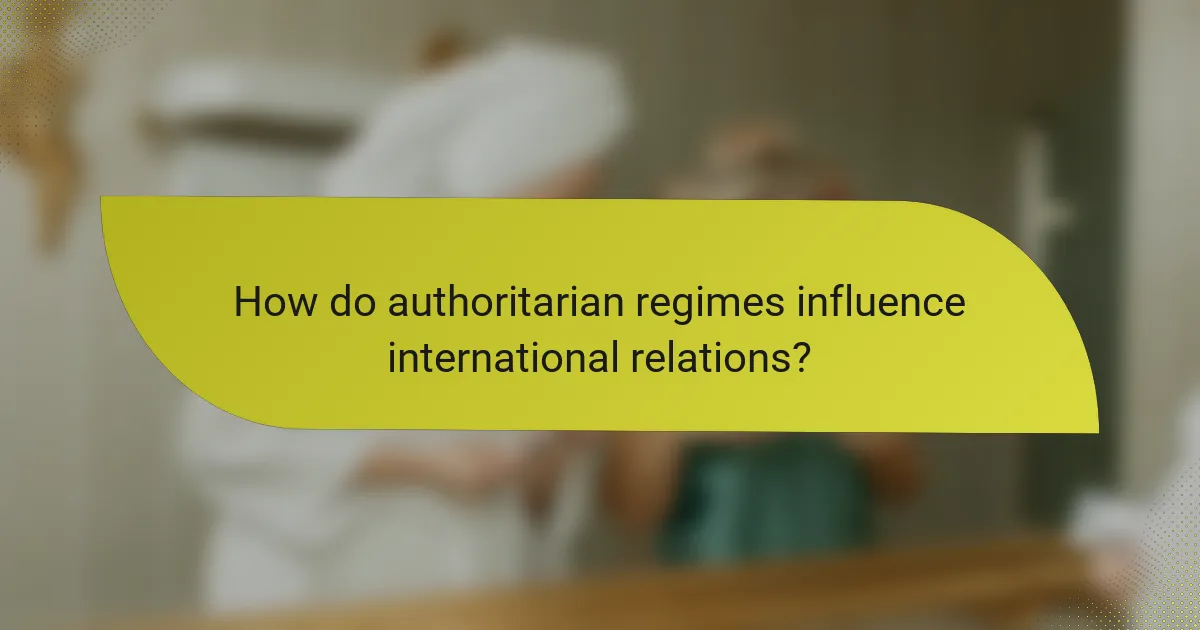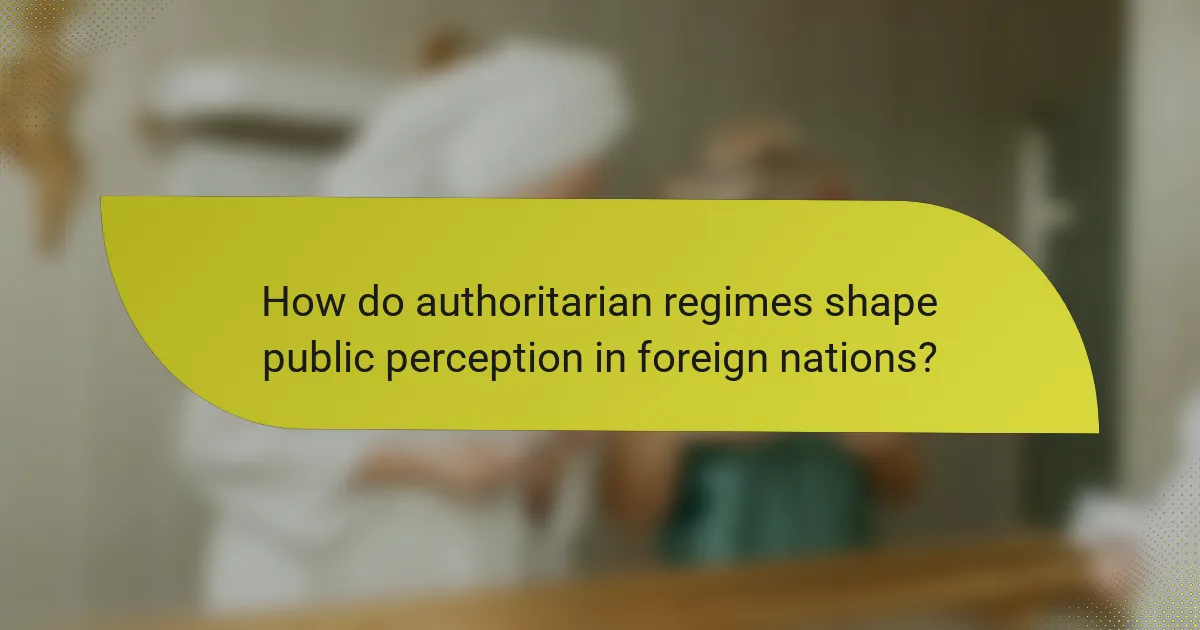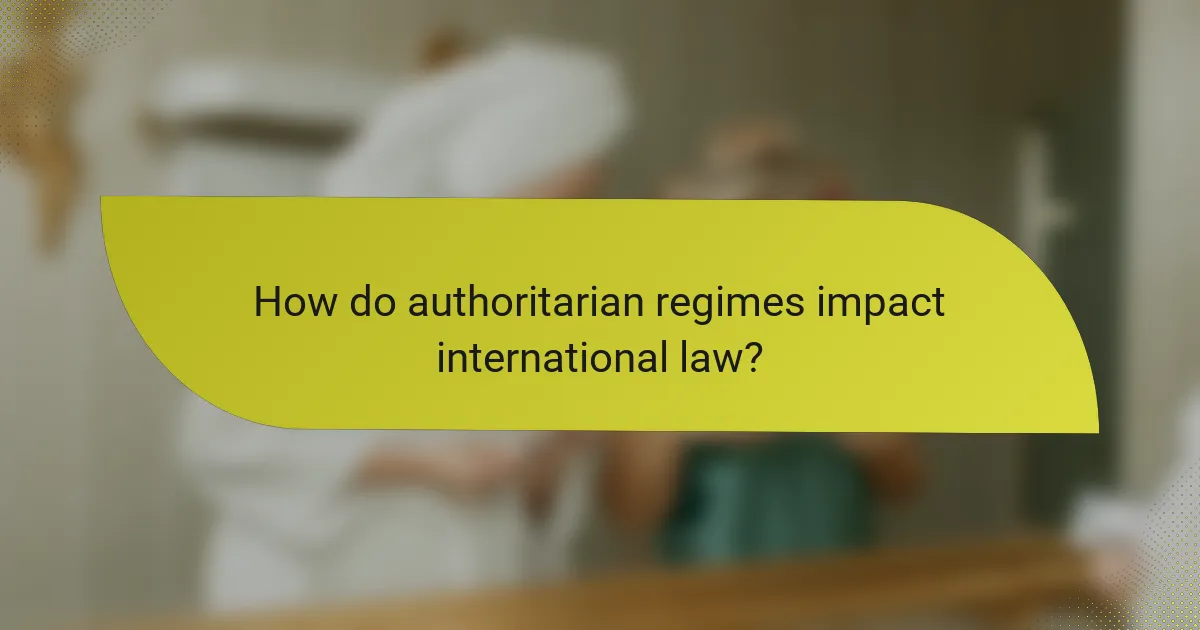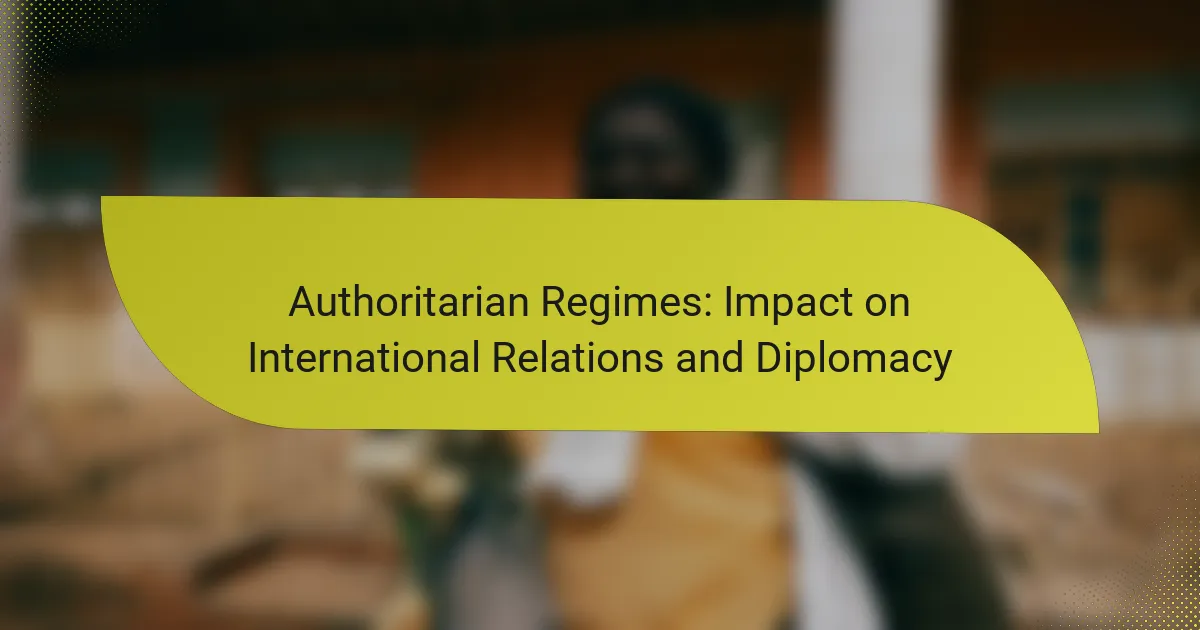Authoritarian regimes play a crucial role in shaping international relations, often prioritizing state control over individual liberties in their diplomatic strategies. By leveraging their centralized power, these governments negotiate and form alliances that reflect their interests, which can undermine global human rights standards and influence trade policies. In response, democracies can counteract this influence through diplomatic efforts and the promotion of democratic values, fostering a more resilient global order.

How do authoritarian regimes influence international relations?
Authoritarian regimes significantly shape international relations through their unique diplomatic strategies, often prioritizing state control over individual freedoms. These governments typically leverage their centralized power to negotiate, form alliances, and influence trade policies in ways that reflect their interests and ideologies.
Impact on diplomatic negotiations
Authoritarian regimes often approach diplomatic negotiations with a focus on maintaining power and control. They may utilize coercive tactics or leverage economic incentives to achieve favorable outcomes. For example, a regime might offer trade concessions in exchange for political support or recognition from other states.
Additionally, these governments may engage in negotiations that prioritize short-term gains over long-term stability, which can lead to fragile agreements. This approach can create distrust among democratic nations, complicating future diplomatic efforts.
Effects on global alliances
Global alliances can be heavily influenced by authoritarian regimes, as they often seek partnerships that bolster their political agendas. Countries like Russia and China have formed alliances that challenge Western hegemony, promoting alternative governance models. These alliances can shift the balance of power in international relations.
Moreover, authoritarian regimes may exploit existing divisions among democracies, fostering a sense of solidarity among like-minded states. This can lead to the formation of blocs that prioritize mutual interests over democratic values, impacting global governance structures.
Shifts in trade policies
Trade policies under authoritarian regimes often reflect their strategic goals rather than free-market principles. These governments may impose tariffs or trade barriers to protect domestic industries or retaliate against perceived threats. For instance, a regime might restrict imports from countries that criticize its human rights record.
Additionally, authoritarian states may engage in state-sponsored trade agreements that favor their political allies, creating an uneven playing field in international markets. This can lead to tensions with democratic nations that advocate for fair trade practices.
Regional security dynamics
Authoritarian regimes can alter regional security dynamics by fostering instability or conflict. Their military strategies often prioritize regime survival, which can lead to aggressive posturing or military interventions in neighboring countries. This behavior can escalate tensions and provoke responses from democratic nations.
Furthermore, these regimes may form security pacts that challenge existing alliances, complicating the security landscape. For example, a coalition of authoritarian states may collaborate on military exercises, signaling a unified front against perceived external threats, which can heighten regional insecurity.

What strategies can democracies employ to counter authoritarian influence?
Democracies can counter authoritarian influence through a combination of diplomatic efforts, economic measures, and the promotion of democratic values. By strengthening international cooperation and supporting democratic movements, democracies can create a more resilient global order.
Strengthening multilateral organizations
Enhancing the role of multilateral organizations is crucial for democracies to counter authoritarian regimes. By collaborating within platforms like the United Nations, NATO, or the European Union, democracies can present a united front against authoritarian practices and policies.
These organizations can facilitate dialogue, promote collective security, and provide a framework for addressing human rights violations. For instance, sanctions imposed through the EU can be more effective when supported by a coalition of member states.
Promoting democratic values
Democracies should actively promote democratic values such as freedom of speech, rule of law, and human rights both domestically and internationally. This can be achieved through educational programs, cultural exchanges, and support for civil society organizations in authoritarian states.
By fostering environments where democratic ideals can thrive, democracies can weaken the appeal of authoritarian regimes. Initiatives like the U.S. Agency for International Development (USAID) programs aim to empower local activists and promote governance reforms.
Economic sanctions and incentives
Economic sanctions and incentives are powerful tools for democracies to influence authoritarian regimes. Targeted sanctions can pressure authoritarian leaders by restricting access to financial resources or key markets, while incentives can encourage positive changes in governance.
For example, the U.S. and EU have implemented sanctions against countries violating human rights, while also offering trade agreements to those that commit to democratic reforms. Balancing sanctions with diplomatic engagement is essential to avoid alienating the populace and to promote gradual change.

How do authoritarian regimes affect global human rights standards?
Authoritarian regimes significantly undermine global human rights standards by prioritizing state control over individual freedoms. These governments often suppress dissent and manipulate international norms to maintain power, leading to a decline in the enforcement of human rights protections worldwide.
Suppression of dissent
Authoritarian regimes typically employ various tactics to suppress dissent, including censorship, intimidation, and imprisonment of political opponents. This suppression not only stifles free expression but also creates an environment where human rights violations go unchecked. For example, countries like North Korea and Belarus have implemented strict laws that punish any form of opposition, discouraging public discourse on human rights.
The impact of dissent suppression extends beyond national borders, as authoritarian states often collaborate to silence critics globally. This can involve extradition agreements or diplomatic pressure to curb activism, further eroding international human rights standards.
Impact on international human rights treaties
Authoritarian regimes often sign international human rights treaties while failing to adhere to their principles, creating a facade of compliance. This hypocrisy can weaken the effectiveness of these treaties, as states may exploit loopholes or refuse to implement necessary reforms. For instance, countries like China and Russia have ratified various human rights agreements but continue to violate the rights of their citizens.
Their participation in international forums can also lead to a dilution of human rights standards, as authoritarian states may lobby for amendments that favor their interests. This dynamic complicates global efforts to promote and protect human rights, making it crucial for democratic nations to hold these regimes accountable.

What role do authoritarian regimes play in global conflicts?
Authoritarian regimes significantly influence global conflicts by supporting insurgent groups and engaging in proxy wars, which can lead to regional instability. Their actions often exacerbate tensions and complicate international diplomacy, making resolution efforts more challenging.
Support for insurgent groups
Authoritarian regimes frequently provide support to insurgent groups as a means to undermine rival governments or expand their influence. This support can include funding, weapons, and training, which empowers these groups to challenge established authorities.
For instance, countries like Russia and Iran have been known to back insurgent factions in Syria and Yemen, respectively. Such backing not only prolongs conflicts but also creates a complex web of alliances that complicates international relations.
Proxy wars and regional instability
Proxy wars are a common tactic employed by authoritarian regimes to exert influence without direct military engagement. By supporting opposing sides in a conflict, these regimes can achieve strategic goals while maintaining plausible deniability.
Examples include the ongoing conflicts in Ukraine and the Middle East, where various authoritarian states have backed different factions, leading to prolonged instability. This situation often results in humanitarian crises and complicates diplomatic efforts to restore peace.

How do authoritarian regimes shape public perception in foreign nations?
Authoritarian regimes significantly influence public perception in foreign nations through controlled narratives and strategic messaging. By manipulating information, these governments can create a favorable image of themselves while undermining their opponents, which affects how their citizens and the international community view them.
State-controlled media narratives
In authoritarian regimes, state-controlled media plays a crucial role in shaping public perception. These media outlets often disseminate propaganda that promotes the government’s agenda, portraying it as a stabilizing force. For instance, news coverage may emphasize national achievements while downplaying or censoring dissent and criticism.
Such narratives can lead to a skewed understanding of international events, as foreign audiences may only receive information that aligns with the regime’s interests. This selective reporting can foster misconceptions about the regime’s legitimacy and intentions, impacting diplomatic relations.
Influence on social media platforms
Social media platforms are increasingly used by authoritarian regimes to influence public perception both domestically and internationally. These governments often employ tactics such as disinformation campaigns and coordinated bot activities to amplify their messages and discredit opponents. This can create an echo chamber effect, where only favorable narratives gain traction.
Moreover, the use of social media allows for rapid dissemination of information, making it challenging for foreign audiences to discern fact from fiction. Engaging with these platforms critically is essential, as they can distort perceptions and complicate diplomatic efforts by creating polarized views of the regime.

What are the economic implications of authoritarian governance on global trade?
Authoritarian governance can significantly impact global trade by creating an environment characterized by trade restrictions, tariffs, and varying levels of investment risk. These factors can alter trade flows, influence pricing, and affect the stability of international business relationships.
Trade restrictions and tariffs
Authoritarian regimes often impose trade restrictions and high tariffs to protect domestic industries or exert political control. These measures can lead to increased costs for imported goods, which may be passed on to consumers, resulting in higher prices and reduced purchasing power.
For example, countries like Russia and Venezuela have implemented strict import tariffs that have limited foreign competition. Businesses looking to enter these markets must navigate complex regulations and potential retaliatory tariffs, which can complicate trade agreements.
Investment risks and opportunities
Investment in authoritarian regimes can present both risks and opportunities. While some investors may find lucrative opportunities due to lower competition, the political instability and lack of transparency often deter foreign investment. Companies must weigh the potential for high returns against the risks of expropriation or sudden regulatory changes.
For instance, in China, foreign direct investment has surged in certain sectors, yet companies face strict regulations and potential government intervention. Understanding the local political landscape and regulatory environment is crucial for making informed investment decisions in these markets.

How do authoritarian regimes impact international law?
Authoritarian regimes significantly influence international law by often prioritizing state sovereignty over global legal norms. This can lead to selective compliance with treaties and a general undermining of established legal frameworks.
Challenges to international legal frameworks
Authoritarian governments frequently challenge international legal frameworks by disregarding human rights conventions and other global agreements. These regimes may justify their actions through claims of national security or cultural sovereignty, which can weaken the enforcement of international laws.
For example, countries like North Korea and Belarus have faced international sanctions for violating human rights, yet they continue to operate outside the norms established by international law. This creates a complex environment where global legal standards are not uniformly applied.
Compliance with global treaties
Compliance with global treaties is often inconsistent among authoritarian regimes. While some may ratify treaties to gain international legitimacy, their actual adherence can be minimal, leading to a gap between legal obligations and practical implementation.
For instance, a regime might sign a treaty on climate change but fail to enact meaningful policies to reduce emissions. This selective compliance can undermine the effectiveness of international agreements and create tensions in diplomatic relations.
